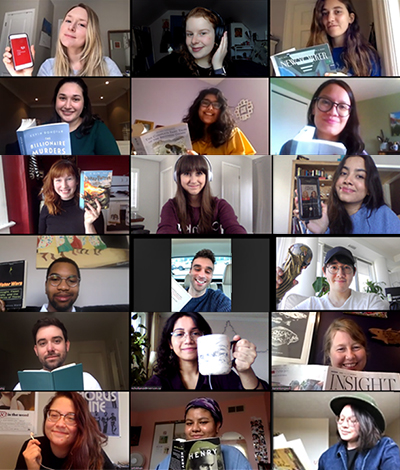A Note from the RRJ Editor

When I stepped foot into the Ryerson Review of Journalism’s office last year, I had no idea I would be shepherding the final—and most nitpicky— details of the magazine’s production remotely. Our work at the RRJ depends heavily on collaboration and communication, both of which have been complicated by restrictions put in place with the onset of the COVID-19 pandemic. Over the past two months, we have adapted our approach to working together through extended deadlines and new strategies of communication.
As we neared the release of our Spring 2020 edition, those concerns were replaced with a new one—how do we acknowledge the current reality of the global pandemic and its impact on the journalism industry without any of our stories directly addressing it?
Writing about anything but the pandemic can feel futile these days. Our inboxes and screens are chock-full of stories addressing the wide range of industries, people and governments affected by it. But our stories had been reported, researched and were in the process of being fact-checked when the World Health Organization declared COVID-19 a pandemic. While releasing a magazine containing reporting that precedes the pandemic at this time may not seem like a reflection of the moment we now live in, a close look at our annual issue is revealing. Despite the current crisis, the stories you will read in the RRJ are relevant. Many of them raise concerns about how we practice journalism and suggest ways in which we may adapt to survive.
There are two stories that we are sharing ahead of publication. Both offer different insights into structural issues relating to our industry. They also highlight the human impact of those organizational realities. I hope you’ll closely read Hannah Alberga’s excellently reported story on how Canadian journalists are navigating the increasingly precarious conditions of employment in media organizations across Canada. The pandemic has only compounded these problems. In April, a survey led by (PDF file) Nanos Research for Friends of Canadian Broadcasting reported (external link) that nearly 500 journalists in Canada lost their jobs in the two weeks following the announcement of the lockdown on March 11. The COVID-19 Media Impact Map (external link) —a collaboration among J-Source, the Local News Research Project and the Canadian Association of Journalists—shows that over 2,000 media workers have lost their jobs and 50 newspapers have closed down permanently. The precarity that Hannah reports on has only increased.
And then there is Neha Chollangi’s story, which highlights the difficulties skilled foreign journalists have in pursuing their profession in Canada. Neha’s piece shows us how these investigative journalists’ work covering political crises and drug cartels put their lives in risk. Why can’t these ace professionals find employment in Canadian news organizations? And what can we learn from them?
There are many other stories in this collection that make for fascinating reads and provide great insight. We were fortunate to have months to research and report on them. Hopefully, the book serves as a reminder of the importance of accuracy and rigour in our profession.
In past years, RRJ mastheads have celebrated the release of the magazine with a launch party. This year, we won’t be rushing into the RRJ’s office drawn by the sight of newly delivered cartons full of evidence of our hard work.We will be waiting, instead, by mailboxes, for the delivery of our publication. If you haven’t already subscribed to the RRJ or bought your current issue, please do so now (external link) . And while you wait for yours to arrive, you can listen to Pull Quotes, our podcast. I recommend the last episode, which previews a selection of stories in the Spring 2020 issue—spoiler alert, it was recorded in our home closets.
That creativity and flexibility we have adopted throughout the process of producing and promoting the magazine is mirrored in the stories.
I know they'll stand the test of time. I hope you agree.